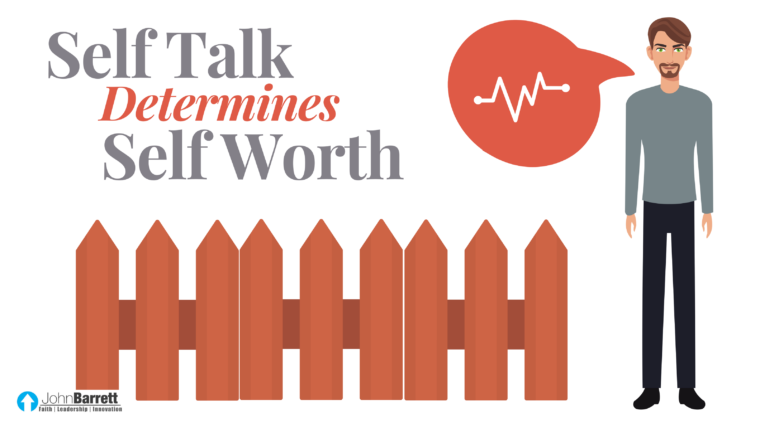
Words are not only powerful, but they’re prophetic as well. They can become a self-fulfilling prophecy of our future.
We all have conversations with ourselves in our minds. In fact, I would argue that the most important conversation we daily have is the one with ourselves. There is no one you spend more time with than yourself. You are internally commentating on every experience you have throughout our entire day. You get no break, no rest, no silence from yourself. You follow yourself around every day at every moment. And guess what? You have an opinion about our every move and every thought you have. There is no human voice louder than the one in our own head.
Make no mistake, the person who has the most influence on you…is yourself. This is why self-talk determines self-worth. It’s the words you say to yourself that will ultimately define who you’ll become. The good news is that you can talk your way into a better future.
There are three aspects of talking to yourself that can set you up for success: What you say, how you say it, and when you say it. Let’s break these down.
What You Say
Your daily conversation will either be an encouragement or a discouragement to yourself; it’s your choice. I have personally found that I am my worst enemy or best friend, depending on the situation. The person who controls my well-being is me. Consequently, I have the hardest time with myself more than anyone else. Over the years, I’ve learned this hard truth: the hardest person I will ever lead is me and me alone. What I say to myself determines how well I do. You can’t speak failure over your life and expect to live successfully. You’ll become what you tell yourself you are. Keep saying you’re a loser and sure enough you’ll live out that experience. Keep saying you’re a winner and watch how you’ll start to win in life. What you talk about you tend to get more of. Keep your self-narrative meticulously positive and I promise you’ll see unbelievable results.
How You Say It
Columbia University professor of psychology, Ethan Kross studied how using different pronouns in your self-talk affects your performance. He formed two groups of people who were told they had to give a speech to a large group of people with only five minutes of preparation. On top of the already high stressed situation, he stated that this large group of people listening would be speech experts judging them and that their presentation would also be videotaped.
Both groups were told that positive self-talk would alleviate their stress and help their chances of being better communicators. One group was instructed to refer to themselves in first-person using the word, “I” in their self-talk. The other group was instructed to refer to themselves in second or third-person, using their name or the word, “you.” Kross’ study found that the second group who used second-person and third-person self-talk were considerably less stressed and performed significantly better in their presentations.”What we find is that a subtle linguistic shift—shifting from ‘I’ to your own name—can have really powerful self-regulatory effects,” Kross told NPR. “It’s almost like you are duping yourself into thinking about you as though you were another person,” Kross said.
You need to talk to yourself just as you would another person. Use your specific name to refer to yourself, and it will boost your confidence. Using your own name allows you to separate yourself from the challenges around you. It lifts you to a high vantage point above the situations you’re in. Speak to yourself as though you are already the person you desire to become.
When You Say It
Everyone deals with negative self-talk especially right when they are getting ready to do something outside their comfort zone. In fact, you’ll always hear the gremlin inside start to chatter when you are pushing yourself further than you’ve ever pushed. That negative voice will tell you that you can’t do it, it won’t work, or who do you think you are. It will try and limit you from your destiny. You have to understand that when you get ready to do something big, negative self-talk will always whisper its screeching voice. You have to combat that voice with a greater voice––a voice of confidence and courage. The moment that you hear the gremlin inside is the moment your inner warrior has to shout louder. It’s a fight. A battle that will determine if you’ll step out. Know that you’ll need to build yourself up when it is the hardest at times. Everything in you may want to tear yourself down, but you have to stand your ground. Expect for this ugly voice to speak up as soon as you start to think bigger, and crush its power with a shout of boldness within. Never let the ugly voice inside of you keep you from the great things in front of you.







Please note: I reserve the right to delete comments that are offensive or off-topic.